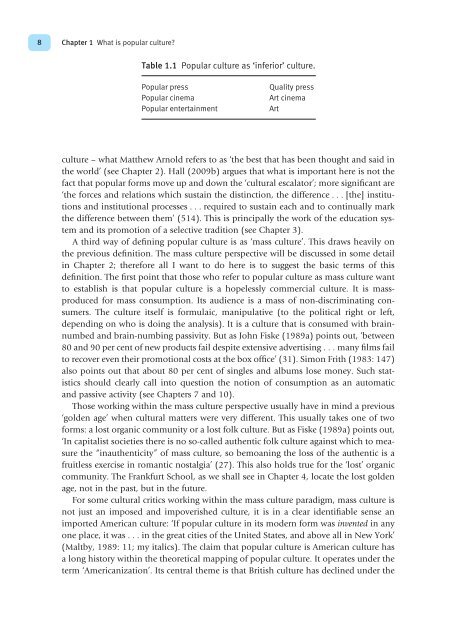Cultural Theory and Popular Culture
Cultural Theory and Popular Culture
Cultural Theory and Popular Culture
You also want an ePaper? Increase the reach of your titles
YUMPU automatically turns print PDFs into web optimized ePapers that Google loves.
8<br />
Chapter 1 What is popular culture?<br />
Table 1.1 <strong>Popular</strong> culture as ‘inferior’ culture.<br />
<strong>Popular</strong> press Quality press<br />
<strong>Popular</strong> cinema Art cinema<br />
<strong>Popular</strong> entertainment Art<br />
culture – what Matthew Arnold refers to as ‘the best that has been thought <strong>and</strong> said in<br />
the world’ (see Chapter 2). Hall (2009b) argues that what is important here is not the<br />
fact that popular forms move up <strong>and</strong> down the ‘cultural escalator’; more significant are<br />
‘the forces <strong>and</strong> relations which sustain the distinction, the difference . . . [the] institutions<br />
<strong>and</strong> institutional processes . . . required to sustain each <strong>and</strong> to continually mark<br />
the difference between them’ (514). This is principally the work of the education system<br />
<strong>and</strong> its promotion of a selective tradition (see Chapter 3).<br />
A third way of defining popular culture is as ‘mass culture’. This draws heavily on<br />
the previous definition. The mass culture perspective will be discussed in some detail<br />
in Chapter 2; therefore all I want to do here is to suggest the basic terms of this<br />
definition. The first point that those who refer to popular culture as mass culture want<br />
to establish is that popular culture is a hopelessly commercial culture. It is massproduced<br />
for mass consumption. Its audience is a mass of non-discriminating consumers.<br />
The culture itself is formulaic, manipulative (to the political right or left,<br />
depending on who is doing the analysis). It is a culture that is consumed with brainnumbed<br />
<strong>and</strong> brain-numbing passivity. But as John Fiske (1989a) points out, ‘between<br />
80 <strong>and</strong> 90 per cent of new products fail despite extensive advertising . . . many films fail<br />
to recover even their promotional costs at the box office’ (31). Simon Frith (1983: 147)<br />
also points out that about 80 per cent of singles <strong>and</strong> albums lose money. Such statistics<br />
should clearly call into question the notion of consumption as an automatic<br />
<strong>and</strong> passive activity (see Chapters 7 <strong>and</strong> 10).<br />
Those working within the mass culture perspective usually have in mind a previous<br />
‘golden age’ when cultural matters were very different. This usually takes one of two<br />
forms: a lost organic community or a lost folk culture. But as Fiske (1989a) points out,<br />
‘In capitalist societies there is no so-called authentic folk culture against which to measure<br />
the “inauthenticity” of mass culture, so bemoaning the loss of the authentic is a<br />
fruitless exercise in romantic nostalgia’ (27). This also holds true for the ‘lost’ organic<br />
community. The Frankfurt School, as we shall see in Chapter 4, locate the lost golden<br />
age, not in the past, but in the future.<br />
For some cultural critics working within the mass culture paradigm, mass culture is<br />
not just an imposed <strong>and</strong> impoverished culture, it is in a clear identifiable sense an<br />
imported American culture: ‘If popular culture in its modern form was invented in any<br />
one place, it was . . . in the great cities of the United States, <strong>and</strong> above all in New York’<br />
(Maltby, 1989: 11; my italics). The claim that popular culture is American culture has<br />
a long history within the theoretical mapping of popular culture. It operates under the<br />
term ‘Americanization’. Its central theme is that British culture has declined under the
















